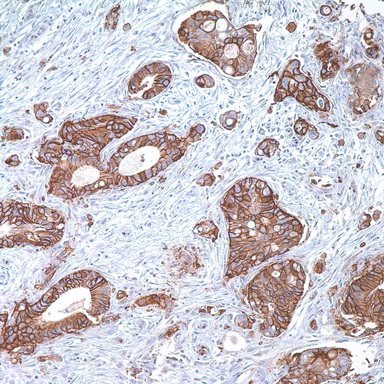Glucose Transporter GLUT1 (SLC2A1) Rabbit Polyclonal Antibody
Other products for "SLC2A1"
Specifications
| Product Data | |
| Applications | IHC |
| Recommended Dilution | IHC: 1:50 - 1:200 |
| Reactivities | Human |
| Host | Rabbit |
| Clonality | Polyclonal |
| Formulation | This antibody is supplied as cell culture supernatant diluted in tris buffered saline, pH 7.3-7.7, with 1% BSA and <0.1% sodium azide. |
| Conjugation | Unconjugated |
| Storage | Store at -20°C as received. |
| Stability | Stable for 12 months from date of receipt. |
| Gene Name | solute carrier family 2 member 1 |
| Database Link | |
| Synonyms | CSE; DYT9; DYT17; DYT18; EIG12; GLUT; GLUT-1; GLUT1; GLUT1DS; HTLVR; PED; SDCHCN |
| Note | Glucose transporter type I (GLUT1), a prototype member of the GLUT superfamily, is a membrane-associated, erythrocyte glucose transport protein. It is a major glucose transporter in the mammalian blood-brain barrier, and also mediates glucose transport in endothelial cells of the vasculature, adipose tissue, and cardiac muscle. GLUT1 is detectable in many human tissues including those of colon, lung, stomach, esophagus, and breast. GLUT1 is overexpressed in malignant cells and in a variety of tumors that include the breast, pancreas, cervix, endometrium, lung, mesothelium, colon, bladder, thyroid, bone, soft tissues, and oral cavity.Immunohistochemical detection of GLUT1 has been shown to discriminate between reactive mesothelium and malignant mesothelioma in more than one study. Anti-GLUT1, anti-claudin1, and anti-EMA are “perineurial” markers that are useful in the diagnosis of perineuriomas. Anti-GLUT1 is also useful in distinguishing benign endometrial hyperplasia from atypical endometrial hyperplasia and adenocarcinoma. GLUT1 expression has been shown to be associated with increased malignant potential, invasiveness, and a poor prognosis in general. Expression of GLUT1 is a late event in colorectal cancer and expression in a high proportion of cancer cells is associated with a high incidence of lymph node metastases. |
| Reference Data | |
| Protein Families | Druggable Genome, ES Cell Differentiation/IPS, Transmembrane |
| Protein Pathways | Adipocytokine signaling pathway, Pathways in cancer, Renal cell carcinoma |
Documents
| Product Manuals |
| FAQs |
{0} Product Review(s)
0 Product Review(s)
Submit review
Be the first one to submit a review
Product Citations
*Delivery time may vary from web posted schedule. Occasional delays may occur due to unforeseen
complexities in the preparation of your product. International customers may expect an additional 1-2 weeks
in shipping.






























































































































































































































































 Germany
Germany
 Japan
Japan
 United Kingdom
United Kingdom
 China
China



